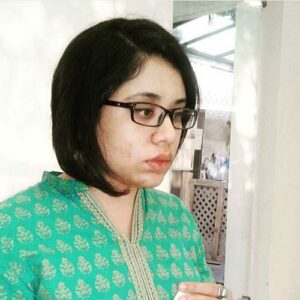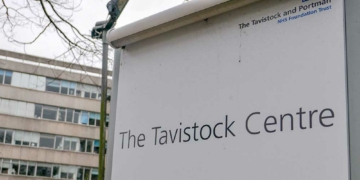In October 2019, Kate Harris and Bev Jackson launched LGB Alliance, after trying for years to get Stonewall to listen to their concerns. They are alarmed about the way LGB people, especially lesbians, are being harmed by gender identity ideology. In the summer of 2020, international followers started contacting Kate and Bev with their plans to set up similar groups in their own country. Since then, LGB groups have launched in Australia, Brazil, Canada, Germany, Iceland, India, Ireland, Mexico, Norway, Poland, Scotland, Serbia, Spain, the UK, the US, and Wales. A Turkish group is on its way. We asked Bev Jackson if she would interview members of these international groups for Lesbian and Gay News. This time the spotlight is on the most recent LGB Alliance group to have formed: India. Bev Jackson interviewed Shefali and Ayush.

Shefali is a lesbian in her thirties from southern India. She has several degrees and works as a French teacher.
B: Shefali, tell us a little about yourself.
S: I lived with dysphoria from the age of 10. My mother laughed at my plans for sex-change surgery and thought it was quite hilarious. I’m happy she reacted like that. My dysphoria simmered in the background until I started, quite late, to surf the internet, and decided I must be trans. From 25 to 31 I identified as trans. Then two things happened at once. First, on a gender-cynical subreddit I saw people ridiculing a blog post by Jane Clare Jones, and I suddenly realised I totally agreed with what she was saying. And then, out of the blue, I fell in love with a woman for the first time. Everything changed overnight.
Ayush is a student from the eastern region of India, aged 19.
B: Ayush, tell us about yourself.
A: I grew up on the internet. I never encountered homophobia offline. But online I started seeing same-sex attraction described as a “genital fetish”. If you rejected it you were called “transphobic” and bigoted and all that. My journey started with watching videos by Douglas Murray in early 2019, then Blaire White and Arielle Scarcella, and I developed my ideas. I saw this pattern: in the West, gay rights came first and then trans rights. In India it’s the other way round. Here we have a law legalising gender self-ID but we still don’t have same-sex marriage.
B: Please explain.
A: The government drafted a bill that included a medical requirement to identify as the “third gender”. But TRAs bullied the government, which gave in and dropped the requirement for a medical certificate. The new trans bill makes sex change surgery free.
The trans rights movement has changed the way hijras are viewed: they have always been seen as a third gender and are allowed to marry other men. But the trans rights movement calls them women. Hijras who have close contact with NGOs are captured: they have come to believe themselves that they are women.
S: It’s a kind of sop to the trans rights movement. To make them seem progressive. But any trans people who want surgery would never go to an Indian hospital but to Thailand for instance, where the hospitals are better. The trans rights movement has changed the way hijras are viewed: they have always been seen as a third gender and are allowed to marry other men. But the trans rights movement calls them women. Hijras who have close contact with NGOs are captured: they have come to believe themselves that they are women.
B: Are you out as gay at college, Ayush?
A: I was completely out to all my friends at school but not yet at college. I saw a confession “rant” on Instagram praising trans identity in a lovey-dovey way I called “cyanide-laced sweetness”. I immediately wrote a confession post of my own countering all the points it made.
B: Where did you get your self-confidence from? Are you out to your parents?
A: We have a good relationship but parents and children never discuss sex in India. Kids aren’t supposed to have any sexuality. Even as adults you can’t take girlfriends or boyfriends home, even if you’re straight. But my parents came with me to watch the first Bollywood movie about same-sex love, and they groove to Taylor Swift. I think they have accepted the hints.
B: Is the gender identity movement in India a domestic development or has it been imported?
S: Definitely an import. It comes from universities – not from teachers but from students and from NGOs funded by the trans lobby.
B: Where is gender ideology in India’s political landscape?
S: Both parties are pushing it. The person recently nominated to the head of the All-India Women’s Conference, a trans person whose chosen name Apsara means “Heavenly Nymph”, knows no more about what it is to be a woman than what it is to be a teaspoon.
A: Aside from the two main parties I want to mention Yogi Adityanath. He recently had a Metro station painted in full rainbow pride colours. He is a trans ally and now celebrated as an LGBT icon. And yet he has made homophobic remarks in parliament.* It’s crazy.
A: Rural India is completely different from the cities. The US elected its first trans state representative last year. India elected its first trans state legislator back in 1998! Rural India has always seen hijras as their own, as sacred.
S: Actually the attitudes to our “third gender” are quite ambivalent. While hijras are seen as sacred, they are also treated badly.
In 2020 we had a queer film festival, but the whole thing was foreign: no Indian content at all. Apart from the “third gender”, who are used as a kind of human shield for the trans rights movement, we don’t really have anything of our own. What we have is mostly online, and in English. Some gay men emigrate because the situation is so bad here.
B: When did you become aware of LGB Alliance?
S: On the gender-critical subreddit, in 2019. I had always been a lukewarm trans supporter and then I became aware of the threat to women’s rights, lesbian rights and also gay rights.
B: And you, Ayush?
A: December 2019, from the “I stand with Maya” tweet from JK Rowling.
B: I’m really struck that all these influences are from the Anglophone world. What about progressive voices in India?
S: In 2020 we had a queer film festival, but the whole thing was foreign: no Indian content at all. Apart from the “third gender”, who are used as a kind of human shield for the trans rights movement, we don’t really have anything of our own. What we have is mostly online, and in English. Some gay men emigrate because the situation is so bad here.
A: Western trans rights ideology is being used by homophobes to deny LGB rights over here. They say giving LGB people rights would be a slippery slope leading to the kind of degeneracy that exists in the West.
B: What about the majority of Indian people who don’t speak such excellent English don’t live on the internet? How can we reach them if we focus on the elite?
S: Once we are present in the mindset, we have to get out: go to Prides, find as many people to work with us as possible. There are Pride events in all cities, but they are fairly elitist and very trans-oriented. We have to start with women’s rights: there are women’s domestic violence charities. These groups are English speaking too. Also captured but easier to influence: more older women. These NGOs are domestic and less tainted by trans ideology.
B: What reactions have you had from Indians since starting LGB Alliance India?
S: Lots of excited reactions from radical feminists. Only one negative reaction from India. But many hostile reactions from the UK.
B: Those racist tweets suggesting you wrote English too well to be Indian!
A: Yes. And I did a thread about a woman who was forced to have a sex change in order to marry her girlfriend. Many hostile people engage in cultural appropriation, invoking hijras to push their trans activist agenda. One person suggested the third gender was imposed on hijras, where in reality the hijras fought to be seen as the third gender.
B: Any problem working with men and women working together?
S: Not at all. I mean, there must be some misogynistic gay men out there, but the men in our group are very pro women.
B: I understand there are no women hijras. But do you have a huge spike in girls wanting to change sex in India?
S: Not yet. Though it will probably come later. Children have no freedom, especially not girls. But there is a certain ancient myth in which women who get changed into men. India is very misogynistic. Women and girls are assumed not to have any sexuality. They are expected to be pure. Girls have no rights. Arranged marriages still take place and they are a kind of rape. Girls can’t make any independent decisions.
At my work, when one teacher mentioned she was lesbian, several parents asked for their children (all of whom were adults!) to be moved to a different class so as not to have to come in contact with a lesbian.
B: No sexuality? What about the Kama Sutra?
S: I don’t know anyone who has read it. There are plenty of erotic pictures. But in everyday life sex is denied: it’s all “lie back and think of England”. The whole point of marriage is having children. There’s no enjoyment involved.
B: How is lesbianism viewed?
S: Either as a pornographic activity or as a phase. At my work, when one teacher mentioned she was lesbian, several parents asked for their children (all of whom were adults!) to be moved to a different class so as not to have to come in contact with a lesbian.
B: What do you most want to achieve with LGB Alliance India?
S: Definitely marriage equality, even though I would never want to get married myself. I want it to be a possibility for everyone. Public opinion is on our side in that respect. [Note: A case came up in court the day after this interview, but marriage equality was rejected]. I don’t want people to have to go abroad because they are miserable in our country. After that I want a grassroots presence. Even though I don’t speak any Indian languages. I want a grassroots movement to make rural lesbians safer: so that their mothers don’t have to worry about them getting raped or not enter the afterlife.
B: Ayush, what do you want to achieve?
A: First, equal marriage, and outreach to rural India. I don’t want to ever read any stories of honour killings ever again. Also a ban on conversion therapy – real conversion therapy. Electric shocks given to gays and lesbians to make them straight. And outreach to the rural areas. I want to join a youth wing of an established party to work in the villages.
B: Do you feel optimistic?
S: On the one hand I can’t see it changing but on the other hand most things start off in India as lost causes. I’m only 30, so I’ve got 40 years to spare!
A: I’m very optimistic, as Gen Z. We should get rid of this gender ideology thing and achieve marriage equality, that’s first on my list right now.
* On 11 December, 2013, the Supreme Court caused widespread disappointment when it set aside the Delhi High Court verdict that decriminalised homosexuality. Adityanath said: “I welcome the Supreme Court verdict. When the bill is brought in Parliament, I will oppose it. I oppose any move to decriminalise homosexuality.”
























Thank you for this article.